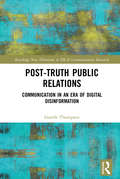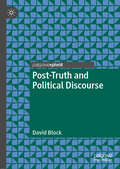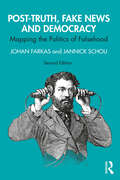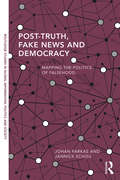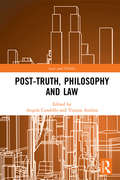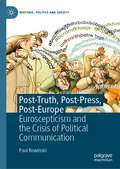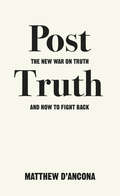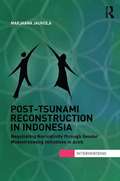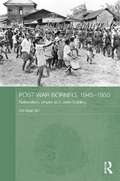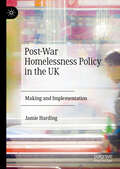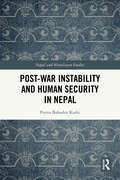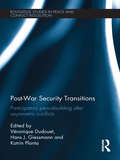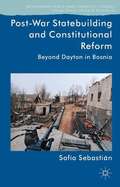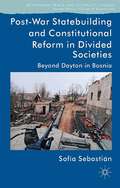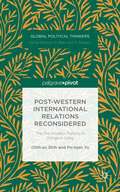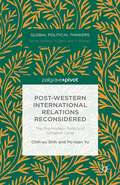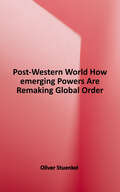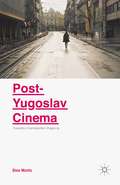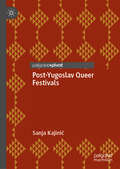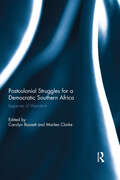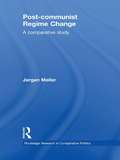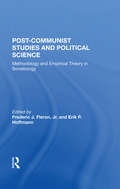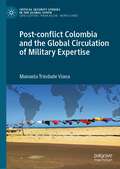- Table View
- List View
Post-Truth Public Relations: Communication in an Era of Digital Disinformation (Routledge New Directions in PR & Communication Research)
by Gareth ThompsonThis book explores the purpose, practice and effects of public relations (PR) at a time that has been variously described as an era of populism, post-truth and fake news. It considers how PR processes have contributed to the current social condition of post-truth and what constitutes PR work in this environment. Post-Truth Public Relations: Communication in an Era of Digital Disinformation proposes that while we can now look back upon the last 80–100 years as a period of classical PR, that style is being supplemented by the emergence of a post-classical form of PR that has emerged in response to the post-truth era. This new style of PR consists of a mixed repertoire of communicative work that matches the new geometry of digital media and delivers a mix of online engagement and persuasion in order to meet the needs of increasingly partisan audiences. Using contemporary case studies and original interviews with PR practitioners in several countries, including China and the Philippines, the book investigates how PR workers have reconciled their role as communicative intermediaries with the post-truth era of digital disinformation. This thought-provoking book will be of great interest to researchers and advanced students interested in the changing nature of PR and its practice.
Post-Truth and Political Discourse
by David BlockIn this book David Block draws on analytical techniques from Critical Discourse Studies to critically investigate truth, truths, the propagation of ignorance and post-truth. Focusing on corrupt discourses and agnotology, he explores the role of anti-intellectualism, emotion and social media in the cultural creation, legitimisation and dissemination of ignorance. While encompassing analysis of discourses on Donald Trump, Brexit, climate change and the Alt-Right, Block furthers our understanding of this global phenomena by providing a revealing analysis of political communications relating to corruption scandals involving the Spanish conservative party. Through an innovative theoretical framework that combines critical discourse and discourse historical approaches with nuanced political analysis, he uncovers the rhetorical means by which esoteric truths and misleading narratives about corruption are created and demonstrates how they become, in their turn, corrupt discourses. This original work offers fresh insights for scholars of Discourse Analysis, Sociolinguistics, Politics, Cultural and Communication Studies, and will also appeal to general readers with an interest in political communication and Spanish politics.
Post-Truth and Political Discourse
by David BlockIn this book David Block draws on analytical techniques from Critical Discourse Studies to critically investigate truth, truths, the propagation of ignorance and post-truth. Focusing on corrupt discourses and agnotology, he explores the role of anti-intellectualism, emotion and social media in the cultural creation, legitimisation and dissemination of ignorance. While encompassing analysis of discourses on Donald Trump, Brexit, climate change and the Alt-Right, Block furthers our understanding of this global phenomena by providing a revealing analysis of political communications relating to corruption scandals involving the Spanish conservative party. Through an innovative theoretical framework that combines critical discourse and discourse historical approaches with nuanced political analysis, he uncovers the rhetorical means by which esoteric truths and misleading narratives about corruption are created and demonstrates how they become, in their turn, corrupt discourses. This original work offers fresh insights for scholars of Discourse Analysis, Sociolinguistics, Politics, Cultural and Communication Studies, and will also appeal to general readers with an interest in political communication and Spanish politics.
Post-Truth, Fake News and Democracy: Mapping the Politics of Falsehood (Routledge Studies In Global Information, Politics And Society Ser.)
by Jannick Schou Johan FarkasThe new edition of Post-Truth, Fake News and Democracy offers an updated overview and critical discussion of contemporary discourses around truth, misinformation, and democracy, while also mapping cutting-edge scholarship. Through in-depth analyses of news articles, commentaries, academic publications, policy briefs, and political speeches, the book engages with the underlying normative ideas that shape how fake news is being addressed across the globe. Doing so, it provides an innovative, critical contribution to contemporary debates on democracy, post-truth, and politics. Three new chapters: Chapter 2 provides an outline of the scholarly field of research into fake news; Chapter 5 examines how issues of fake news and (mis)information have become intertwined with contemporary crisis events; and Chapter 9 presents democratic alternatives to post-truth solutionism. A new foreword by Professor Sarah Banet-Weiser. Fully updated examples and studies from contemporary events, including the COVID-19 pandemic, the United States Capitol attack, and the Russian invasion of Ukraine. Extended discussions on the causes of democratic decline, currently proposed solutions to fake news, and democratic alternatives to our current predicament. Interesting, informative, and well documented, Post-Truth, Fake News and Democracy continues its commitment to understand and engage with the current state and future of democracy.
Post-Truth, Fake News and Democracy: Mapping the Politics of Falsehood (Routledge Studies in Global Information, Politics and Society)
by Jannick Schou Johan FarkasWestern societies are under siege, as fake news, post-truth and alternative facts are undermining the very core of democracy. This dystopian narrative is currently circulated by intellectuals, journalists and policy makers worldwide. In this book, Johan Farkas and Jannick Schou deliver a comprehensive study of post-truth discourses. They critically map the normative ideas contained in these and present a forceful call for deepening democracy. The dominant narrative of our time is that democracy is in a state of emergency caused by social media, changes to journalism and misinformed masses. This crisis needs to be resolved by reinstating truth at the heart of democracy, even if this means curtailing civic participation and popular sovereignty. Engaging with critical political philosophy, Farkas and Schou argue that these solutions neglect the fact that democracy has never been about truth alone: it is equally about the voice of the democratic people. Post-Truth, Fake News and Democracy delivers a sobering diagnosis of our times. It maps contemporary discourses on truth and democracy, foregrounds their normative foundations and connects these to historical changes within liberal democracies. The book will be of interest to students and scholars studying the current state and future of democracy, as well as to a politically informed readership.
Post-Truth, Philosophy and Law (Law and Politics)
by Tiziana Andina Angela CondelloIn the wake of Brexit and Trump, the debate surrounding post-truth fills the newspapers and is at the center of the public debate. Democratic institutions and the rule of law have always been constructed and legitimized by discourses of truth. And so the issue of "post-truth" or "fake truth" can be regarded as a contemporary degeneration of that legitimacy. But what, precisely, is post-truth from a theoretical point of view? Can it actually change perceptions of law, of institutions and political power? And can it affect our understanding of society and social relations? What are its ideological premises? What are the technical conditions that foster it? And most importantly, does it have anything to teach lovers of the truth? Pursuing an interdisciplinary perspective, this book gathers both well-known and newer scholars from a range of subject areas, to engage in a philosophical interrogation of the relationship between truth and law.
Post-Truth, Post-Press, Post-Europe: Euroscepticism and the Crisis of Political Communication (Rhetoric, Politics and Society)
by Paul RowinskiThis book explores whether a beleaguered press in recent years has been developing an emotive, Eurosceptic post-truth rhetoric of its own – competing for attention with populist politicians. These politicians now by-pass the media, talking directly to their publics in blogs, on Twitter and Facebook. In the post-truth age, objective facts are less influential in shaping opinion than appeals to emotion. Audiences congregate around views they share and want to believe. The author presents a critical discourse analysis of the language used by populist politicians online, on Facebook, and subsequently quoted in the press, which highlights how the political rhetoric of Italian and British politicians is often at its most inflammatory around the issue of immigration. The same goes for the press. The Italian case study focuses on media coverage of the 2014 and 2019 European elections and 2018 general election. The British case study examines press reporting of the 2016 UK referendum on EU membership, the 2017 general election, and the September 2019 parliamentary debate immediately following the UK Supreme Court ruling that proroguing of Parliament was illegal. From the picture that emerges, the author argues that journalists need to change how they report, to challenge the post-truthers, holding them to account and pressing them on the facts while also harnessing the emotions of disaffected publics.
Post-Truth: The New War on Truth and How to Fight Back
by Matthew d'AnconaWelcome to the Post-Truth era— a time in which the art of the lie is shaking the very foundations of democracy and the world as we know it. The Brexit vote; Donald Trump’s victory; the rejection of climate change science; the vilification of immigrants; all have been based on the power to evoke feelings and not facts. So what does it all mean and how can we champion truth in in a time of lies and ‘alternative facts’?In this eye-opening and timely book, Post-Truth is distinguished from a long tradition of political lies, exaggeration and spin. What is new is not the mendacity of politicians but the public’s response to it and the ability of new technologies and social media to manipulate, polarise and entrench opinion. Where trust has evaporated, conspiracy theories thrive, the authority of the media wilt and emotions matter more than facts . Now, one of the UK’s most respected political journalists, Matthew d’Ancona investigates how we got here, why quiet resignation is not an option and how we can and must fight back.
Post-Tsunami Reconstruction in Indonesia: Negotiating Normativity through Gender Mainstreaming Initiatives in Aceh (Interventions)
by Marjaana JauholaThis book offers a critical analysis of gender mainstreaming initiatives in the post-tsunami context in Indonesia. Aiming to challenge the terms of the debate in gender mainstreaming and disaster reconstruction efforts, Jauhola offers an important contribution for the discussion of what ‘feminisms and disasters’ could be. The work provides an in-depth analysis of three governmental practices of gender mainstreaming: the use of the concept pair sex/gender; the use of gender analysis and the use of project management tools and local subversion that challenges the potential normative violence of gender mainstreaming. Providing feminist intersectional reading of gender mainstreaming the book aims to illustrate that this framework does not lack political alternatives, but rather, it offers an alternative focus for feminism and for the re-conceptualisation of ‘political’, and provides tools for practitioners of aid aiming to come to grips with the complexity of gender equality policy agenda and its potential violent social consequences in global politics. Drawing on extensive field research in Aceh, this text is one of the first book length studies, and thus provides a significant addition to Indonesian literatures on intersectional analysis of gender, religion, heteronormativity, and feminist subversive practice. It is a vital resource for those interested in understanding global interconnections of localised disaster and conflict reconstruction.
Post-War Borneo, 1945-1950: Nationalism, Empire and State-Building (Routledge Studies in the Modern History of Asia)
by Ooi Keat GinThis book examines Borneo, both British Borneo – Brunei, Sarawak and North Borneo – and Dutch Borneo in the period 1945-1950. Borneo then was at the crossroads. Following the Japanese Occupation, the likely future status of the various Bornean territories was not at all clear, and the book discusses the various factions and powers, both local and international, who were contending for control in this period. It examines the effects of the Japanese surrender, the impact of the subsequent interregnum and Australian and British military administrations, the reassertion of Dutch control, the struggle for Indonesian independence, and movements for local autonomy, reassertion of ethnic rights, interests and identity. It charts developments throughout this volatile and uncertain period, up to the point at which the newly independent Republic of Indonesia emerged and a more settled period began.
Post-War Homelessness Policy in the UK: Making and Implementation
by Jamie HardingThis book discusses homelessness policy in the UK from 1945 to 2019. It identifies five key factors that have driven policy: the favoured explanations for homelessness, distinctions between different groups of homeless people, demand for social rented housing, geographical differences and the forms of prevention preferred by policy makers. The account analyses how these factors have influenced key pieces of legislation such as the 1948 National Assistance Act, the 1977 Housing (Homeless Persons) Act and the 2002 Homelessness Act. It also identifies the key issues that policy has sought to address at different times, including children being taken into care because of their parents’ homelessness, rough sleeping, the use of bed and breakfast hotels as temporary accommodation, social exclusion and welfare reform. In addition to published sources and archival material, the book draws on the experiences of two former Ministers and other key figures in the development of homelessness policy.
Post-War Instability and Human Security in Nepal (Nepal and Himalayan Studies)
by Purna Bahadur KarkiThis book studies post-war instability in Nepal and its effect on human security. It looks at Nepal’s Maoist People’s War, the Nepali peace-building process, and political development in Nepal. Drawing on in-depth interviews, the book discusses multiple issues of the peace-building process, including education, health, economics, income, gender inequality, human rights, and the sociopolitical inclusion of marginal people and backward communities. The author also explores the relationship between peace-building and the broader concept of freedom, examining factors that affect Nepali determination.The book will be useful for students and researchers of politics, peace and conflict studies, sociology, development studies, strategic and security studies, contemporary history, international relations, Nepal studies, and South Asian studies.
Post-War Security Transitions: Participatory Peacebuilding after Asymmetric Conflicts (Routledge Studies in Peace and Conflict Resolution)
by Véronique Dudouet Hans J. Giessmann Katrin PlantaThis book explores the conditions under which non-state armed groups (NSAGs) participate in post-war security and political governance. The text offers a comprehensive approach to post-war security transition processes based on five years of participatory research with local experts and representatives of former non-state armed groups. It analyses the successes and limits of peace negotiations, demobilisation, arms management, political or security sector integration, socio-economic reintegration and state reform from the direct point of view of conflict stakeholders who have been central participants in ongoing and past peacebuilding processes. Challenging common perceptions of ex-combatants as "spoilers" or "passive recipients of aid", the various contributors examine the post-war transitions of these individuals from state challengers to peacebuilding agents. The book concludes on a cross-country comparative analysis of the main research findings and the ways in which they may facilitate a participatory, inclusive and gender-sensitive peacebuilding strategy. Post-War Security Transitions will be of much interest to students of peacebuilding, security governance, war and conflict studies, political violence and IR in general.
Post-War Statebuilding and Constitutional Reform in Divided Societies: Beyond Dayton in Bosnia (Rethinking Peace and Conflict Studies)
by Sofía Sebastián-AparicioPost-War Statebuilding and Constitutional Reform in Divided Societies.
Post-War Statebuilding and Constitutional Reform: Beyond Dayton in Bosnia (Rethinking Peace and Conflict Studies)
by Sofía Sebastián-AparicioSebastián explores the experience of statebuilding and constitution making after violent conflict, using the failed reform of Dayton in Bosnia and Herzegovina as a case study to reflect upon the fundamental questions of post-war statebuilding, reform and the role of local and external actors.
Post-Western International Relations Reconsidered: The Pre-Modern Politics of Gongsun Long (Global Political Thinkers)
by Chih-Yu Shih Po-Tsan YuPost-Western International Relations Reconsidered.
Post-Western International Relations Reconsidered: The Pre-Modern Politics of Gongsun Long (Global Political Thinkers)
by Chih-yu Shih Po-tsan YuThis study offers a critique of international relations from the perspective of a pre-modern Chinese thinker, Gongsun Long. It explores both the potential and the danger of the post-Western quest for geo-cultural distinction.
Post-Western World: How Emerging Powers are Remaking Global Order
by Oliver StuenkelWith the United States' superpower status rivalled by a rising China and emerging powers like India and Brazil playing a growing role in international affairs, the global balance of power is shifting. But what does this mean for the future of the international order? Will China dominate the 21st Century? Will the so-called BRICS prove to be a disruptive force in global affairs? Are we headed towards a world marked by frequent strife, or will the end of Western dominance make the world more peaceful? <p><p>In this provocative new book, Oliver Stuenkel argues that our understanding of global order and predictions about its future are limited because we seek to imagine the post-Western world from a parochial Western-centric perspective. Such a view is increasingly inadequate in a world where a billions of people regard Western rule as a temporary aberration, and the rise of Asia as a return to normalcy. In reality, China and other rising powers that elude the simplistic extremes of either confronting or joining existing order are quietly building a "parallel order" which complements today's international institutions and increases rising powers' autonomy. Combining accessibility with expert sensitivity to the complexities of the global shift of power, Stuenkel's vision of a post-Western world will be core reading for students and scholars of contemporary international affairs, as well as anyone interested in the future of global politics.
Post-Yugoslav Cinema: Towards a Cosmopolitan Imagining
by Dino MurticDrawing primarily on selected filmic texts from former-Yugoslavia, the book examines key social and political events that triggered the Yugoslav wars in the 1990s. Yugoslav politics and society are set within the broader artistic and cinematic strategies that helped stabilise post-Yugoslav territories strategies that were part of the national desire of looking forward to a time of 'perpetual peace' and its subsequent cosmopolitan norms. It argues that filmic texts demonstrate the degree to which nationalism was at the heart of the violent disintegration of Yugoslavia. Yet, the concern of the argument is not simply to offer a filmic critique but to develop an alternative to nationalism; namely, a theoretical framework through which cosmopolitan humanism is at the forefront of addressing former Yugoslavia's political wounds.
Post-Yugoslav Queer Festivals
by Sanja KajinićThis book explores two festivals over ten years: Queer Zagreb and Ljubljana Gay and Lesbian Film Festival. Kajinić focuses on the festivals’ participation in a regional network of queer festivals and provides an insight into how these festivals and their audiences negotiated the limits of non-normativity in particularly intensive ways between 2002-2012. By offering an interdisciplinary perspective and exploring the possibilities of critical visual methodology, the author relates the history of these important cultural projects and their organizational practices to the ways in which they impacted the lives of their participants.Post-Yugoslav Queer Festivals will be of interest to readers studying the region of Southeast Europe from a range of perspectives including gender studies, history, politics and festival studies.
Post-colonial struggles for a democratic Southern Africa: Legacies of Liberation
by Carolyn Bassett and Marlea ClarkeNational liberation, one of the grand narratives of the twentieth century, has left a weighty legacy of unfulfilled dreams. This book explores the ongoing struggle for legitimate, accountable political leaders in postcolonial Southern Africa, focussing on dilemmas arising when ex-liberation movements form the governments. While the spread of multi-party democracy to most countries in the region is to be celebrated, democratic practice often has been superficial - a limited, elitist politics that relies on the symbols of the liberation struggle to legitimate de facto one-party rule and authoritarian practices. Using country cases from Tanzania, Swaziland, Zimbabwe, South Africa and Zambia, the collection explores three subthemes relevant to postcolonial governance in Southern Africa: how the struggle for liberation shapes the character of political transformation, the nature of rule in one-party dominant states headed by former liberation movements, and the processes of governance and resistance in post-liberation contexts.This book was published as a special issue of the Journal of Contemporary African Studies.
Post-communist Nostalgia (Berghahn Ser.)
by Zsuzsa Gille Maria TodorovaAlthough the end of the Cold War was greeted with great enthusiasm by people in the East and the West, the ensuing social and especially economic changes did not always result in the hoped-for improvements in people's lives. This led to widespread disillusionment that can be observed today all across Eastern Europe. Not simply a longing for security, stability, and prosperity, this nostalgia is also a sense of loss regarding a specific form of sociability. Even some of those who opposed communism express a desire to invest their new lives with renewed meaning and dignity. Among the younger generation, it surfaces as a tentative yet growing curiosity about the recent past. In this volume scholars from multiple disciplines explore the various fascinating aspects of this nostalgic turn by analyzing the impact of generational clusters, the rural-urban divide, gender differences, and political orientation. They argue persuasively that this nostalgia should not be seen as a wish to restore the past, as it has otherwise been understood, but instead it should be recognized as part of a more complex healing process and an attempt to come to terms both with the communist era as well as the new inequalities of the post-communist era.
Post-communist Regime Change: A Comparative Study (Routledge Research in Comparative Politics)
by Jørgen MøllerThis book seeks to explain the divergent political pathways of twenty six post-communist states, following the breakdown and eventual collapse of communism in 1989-1991. Considering the trajectories of individual states between 1990 – 2007, this book challenges two central bodies of theory relating to democratization and regime change. Through a sustained analysis of global and post-communist developments within this time period, the author shows that claims of an increasing asymmetry between the ‘electoral’ and ‘liberal’ elements of modern democracy have been greatly exaggerated. The author goes on to contend that in accounting for the geographical dispersion of post-communist regime forms, deeper structural factors should be considered as crucial. The book is divided into the following parts: Part I demonstrates how different conceptualisations of democracy can lead to very different conclusions about the empirical dynamics of democratization. Part II contrasts different explanations of post-communist political change and provides an integrated framework for explaining the political pathways encountered within the former Eastern Bloc. This book will be of interest to students and scholars of post-communist studies, democratization studies, comparative politics and regime change.
Post-communist Studies And Political Science: Methodology And Empirical Theory In Sovietology
by Jr. Fleron Erik P HoffmannSerious stock-taking is in progress now among practitioners of whathas been called Sovietology, meaning studies of the Union of SovietSocialist Republics. The reason is that the field for the most part hadnot been expecting what happened in 1991: The USSR collapsed andwent out of existence as a unified state system governing a sixth ofthe world's territory, having allowed its East European empire tofree itself from Soviet dominance somewhat earlier.It might be said in defense of Sovietology that, by the beginningof the 1980s, it understood that economic and political crises werebrewing in the Soviet Union and its outer empire. But the field asa whole failed to grasp the full depth of the systemic crisis in SovietRussia and the destructive or self-destructive potentialities inherentin it. As the editors of this valuable volume write in the Introduction:"Sovietology was not prepared for perestroika and postcommunism."
Post-conflict Colombia and the Global Circulation of Military Expertise (Critical Security Studies in the Global South)
by Manuela Trindade VianaBy challenging more common analyses that point to the existence of a "post-conflict scenario" in Colombia and those that resist the narrative of "success", both of which operate within the logic of presence/absence of violence, this book proposes instead that we think of "post-conflict" in terms of the transformation of the rules on the use of violence. The analysis unfolds in two parts: the first explores the conditions of possibility of the Colombian “success story” and the web of criteria legitimizing the “success”, as well as the silencing mechanisms allowing for Colombia to circulate internationally as a formula to be replicated in other parts of the world; the second, focuses on the historicization of the mechanisms through which new rules are transmitted among the professionals of the public force, specifically the transformations of military schools and training centers in Colombia from times of “war” to “peace”. The author argues that key to this transformation is a unique discursive articulation around the “military professional” which slides from “citizen-soldier” to “expert-soldier”.
